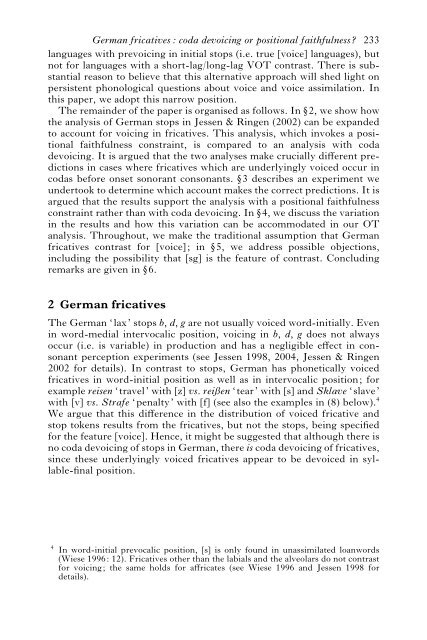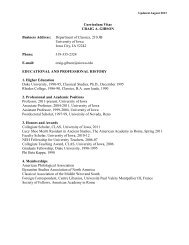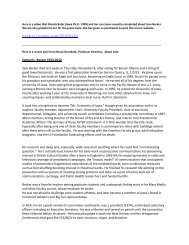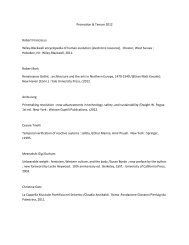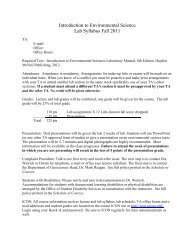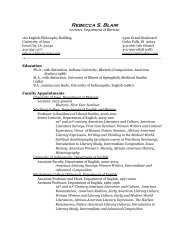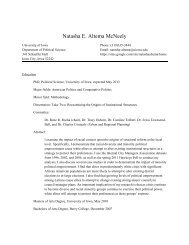German fricatives: coda devoicing or positional faithfulness?
German fricatives: coda devoicing or positional faithfulness?
German fricatives: coda devoicing or positional faithfulness?
You also want an ePaper? Increase the reach of your titles
YUMPU automatically turns print PDFs into web optimized ePapers that Google loves.
<strong>German</strong> <strong>fricatives</strong>: <strong>coda</strong> <strong>devoicing</strong> <strong>or</strong> <strong>positional</strong> <strong>faithfulness</strong>? 233<br />
languages with prevoicing in initial stops (i.e. true [voice] languages), but<br />
not f<strong>or</strong> languages with a sh<strong>or</strong>t-lag/long-lag VOT contrast. There is substantial<br />
reason to believe that this alternative approach will shed light on<br />
persistent phonological questions about voice and voice assimilation. In<br />
this paper, we adopt this narrow position.<br />
The remainder of the paper is <strong>or</strong>ganised as follows. In w2, we show how<br />
the analysis of <strong>German</strong> stops in Jessen & Ringen (2002) can be expanded<br />
to account f<strong>or</strong> voicing in <strong>fricatives</strong>. This analysis, which invokes a <strong>positional</strong><br />
<strong>faithfulness</strong> constraint, is compared to an analysis with <strong>coda</strong><br />
<strong>devoicing</strong>. It is argued that the two analyses make crucially different predictions<br />
in cases where <strong>fricatives</strong> which are underlyingly voiced occur in<br />
<strong>coda</strong>s bef<strong>or</strong>e onset son<strong>or</strong>ant consonants. w3 describes an experiment we<br />
undertook to determine which account makes the c<strong>or</strong>rect predictions. It is<br />
argued that the results supp<strong>or</strong>t the analysis with a <strong>positional</strong> <strong>faithfulness</strong><br />
constraint rather than with <strong>coda</strong> <strong>devoicing</strong>. In w4, we discuss the variation<br />
in the results and how this variation can be accommodated in our OT<br />
analysis. Throughout, we make the traditional assumption that <strong>German</strong><br />
<strong>fricatives</strong> contrast f<strong>or</strong> [voice]; in w5, we address possible objections,<br />
including the possibility that [sg] is the feature of contrast. Concluding<br />
remarks are given in w6.<br />
2 <strong>German</strong> <strong>fricatives</strong><br />
The <strong>German</strong> ‘lax’ stops b, d, g are not usually voiced w<strong>or</strong>d-initially. Even<br />
in w<strong>or</strong>d-medial intervocalic position, voicing in b, d, g does not always<br />
occur (i.e. is variable) in production and has a negligible effect in consonant<br />
perception experiments (see Jessen 1998, 2004, Jessen & Ringen<br />
2002 f<strong>or</strong> details). In contrast to stops, <strong>German</strong> has phonetically voiced<br />
<strong>fricatives</strong> in w<strong>or</strong>d-initial position as well as in intervocalic position; f<strong>or</strong><br />
example reisen ‘travel’ with [z] vs. reißen ‘tear’ with [s] and Sklave ‘slave’<br />
with [v] vs. Strafe ‘penalty’ with [f] (see also the examples in (8) below).4<br />
We argue that this difference in the distribution of voiced fricative and<br />
stop tokens results from the <strong>fricatives</strong>, but not the stops, being specified<br />
f<strong>or</strong> the feature [voice]. Hence, it might be suggested that although there is<br />
no <strong>coda</strong> <strong>devoicing</strong> of stops in <strong>German</strong>, there is <strong>coda</strong> <strong>devoicing</strong> of <strong>fricatives</strong>,<br />
since these underlyingly voiced <strong>fricatives</strong> appear to be devoiced in syllable-final<br />
position.<br />
4 In w<strong>or</strong>d-initial prevocalic position, [s] is only found in unassimilated loanw<strong>or</strong>ds<br />
(Wiese 1996: 12). Fricatives other than the labials and the alveolars do not contrast<br />
f<strong>or</strong> voicing; the same holds f<strong>or</strong> affricates (see Wiese 1996 and Jessen 1998 f<strong>or</strong><br />
details).


